|
|
|
Sort Order |
|
|
|
Items / Page
|
|
|
|
|
|
|
| Srl | Item |
| 1 |
ID:
158914
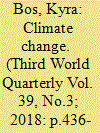

|
|
|
|
|
| Summary/Abstract |
Under the Paris Agreement, 80% of all proven fossil fuel reserves become stranded resources and investments already made in such resources turn into stranded assets. Much of the existing literature focuses on equitable burden sharing; only a few articles examine the risks for developing countries that invest in new fossil fuels. Hence, this paper addresses the question: What are the risks of investing in fossil fuels for developing countries? In doing so, it examines Kenya, a prospective fossil fuel producer, and China, an investor in fossil fuels. In terms of short- to long-term risks, ignoring new fossil fuels and investing in renewables is favourable and politically, socially, ecologically and economically more rewarding, not least because latecomers to development run the risk of having to compensate investors when new fossil fuel assets strand prematurely and become unrecoverable.
|
|
|
|
|
|
|
|
|
|
|
|
|
|
|
|
| 2 |
ID:
158912
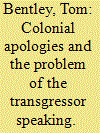

|
|
|
|
|
| Summary/Abstract |
Can state apologies help reconciliation between former coloniser and colonised? Much of the literature on political apologies is optimistic regarding their potential to aid reconciliation. Even critical work frequently dispraises particular case studies, while maintaining a normative commitment to apology. Building on a growing postcolonial literature on the subject, this article contributes a more fundamental critique of colonial apology. It argues that its inherent structure entails a format that accords the politician of the transgressor state an elevated speaking position. This results in the ritual being predisposed to problematic representations of the colonised and sanitised narratives of the transgression. The argument is situated within Edward Said’s considerations on representation in the colonial process.
|
|
|
|
|
|
|
|
|
|
|
|
|
|
|
|
| 3 |
ID:
158917


|
|
|
|
|
| Summary/Abstract |
The level of, and trends in, global inequality and global poverty are indicative assessments of who has benefited from economic growth. The revision of price data has led to a reassessment of those estimates. Through an extensive overview of the implications, we argue that the data can be read in different ways. Official estimates show global extreme poverty and global inequality are considerably lower than previously thought. We argue that these changes are much less significant than they at first appear, and we present a more nuanced alternative interpretation by exploring changes across the entire global distribution.
|
|
|
|
|
|
|
|
|
|
|
|
|
|
|
|
| 4 |
ID:
158920
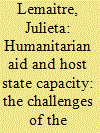

|
|
|
|
|
| Summary/Abstract |
How can humanitarian actors operate in a host state with significant subnational variations in willingness and capacity to meet its obligations? This is an issue of pressing importance, given the expansion of humanitarian aid to middle-income countries with growing state capacity, but with persistent infrastructural weakness in their periphery. The article illustrates the challenges and potentialities of engaging these states through the case study of the Norwegian Refugee Council (NRC) in Colombia. It describes the way the NRC has located its offices in peripheral areas, and how its activities have fostered the rule of law, successfully using rights-based approaches to strengthen subnational state institutions, activate and mobilise citizen demands and bridge national and subnational administrations. The article concludes that these activities, operated by officers with extensive practical knowledge and local trust networks, can open the way for durable solutions for humanitarian crisis, but can also provoke backlash from subnational actors.
|
|
|
|
|
|
|
|
|
|
|
|
|
|
|
|
| 5 |
ID:
158915
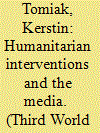

|
|
|
|
|
| Summary/Abstract |
Humanitarian interventions routinely come with media components, because of the media’s assumed ability to counter hate and support reconciliation. Radio programmes for peace should enable audiences to withstand manipulation and react non-violently in conflict situations. Based in the ideological tradition of modernisation theory, these programmes assume that violent conflict can be overcome by educating individuals. Based on original data from South Sudan, this paper argues that social structure and duty to leaders play a bigger role and that present media interventions are ill suited to the problem. Interventions need to be tailored to the situation instead of relying on generalised responses.
|
|
|
|
|
|
|
|
|
|
|
|
|
|
|
|
| 6 |
ID:
158921
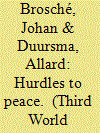

|
|
|
|
|
| Summary/Abstract |
Why do some peace agreements end armed conflicts whereas others do not? Previous studies have primarily focused on the relation between warring parties and the provisions included in peace agreements. Prominent mediators, however, have emphasised the importance of stakeholders at various levels for the outcome of peace agreements. To match the experience of these negotiators we apply a level-of-analysis approach to examine the contextual circumstances under which peace agreements are concluded. While prominent within the causes of war literature, level-of-analysis approaches are surprisingly scant in research about conflict resolution. This article compares two Sudanese Peace Agreements: the Comprehensive Peace Agreement (2005) that ended the North–South war and led to the independence of South Sudan, and the Darfur Peace Agreement (2006) which failed to end fighting in Darfur. We find that factors at the local, national and international level explain the different outcomes of the two agreements. Hence, the two case studies illustrate the merit of employing a level-of-analysis approach to study the outcome of peace agreements. The main contribution of this article is that it presents a new theoretical framework to understand why some peace agreements terminate armed conflict whereas others do not.
|
|
|
|
|
|
|
|
|
|
|
|
|
|
|
|
| 7 |
ID:
158919
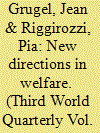

|
|
|
|
|
| Summary/Abstract |
What happens to the politics of welfare in the Global South when neoliberal values are questioned? How is welfare re-imagined and re-enacted when governments seek to introduce progressive change? Latin America provides an illustration and a valuable entry point to debates about ‘interruptions’ of neoliberalism and the changing nature of social policy. Drawing on examples of disability policies in Ecuador and care provision in Uruguay, we argue that there is a ‘rights turn’ in welfare provision under the left that reflects a recognition that previous welfare models left too many people out, ethically and politically, as well as efforts to embed welfare more centrally in new patterns of respect for socio-economic and identity-based human rights. Given Latin America’s recent contestation of neoliberal development as well as its history of sometimes dramatic welfare shifts, the emergence of rights-based social provision is significant not just for the region but also in relation to global struggles for more equitable governance.
|
|
|
|
|
|
|
|
|
|
|
|
|
|
|
|
| 8 |
ID:
158913
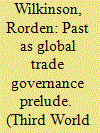

|
|
|
|
|
| Summary/Abstract |
This paper peers backwards into the history of the multilateral trading system and its development over the past half century as a means of considering what may lie beyond the horizon for the future of global trade governance. Its purpose is to underscore the necessity and urgency for root-and-branch reform of the multilateral trading system. It achieves this by comparing and contrasting the global trading system of 50 years ago with its modern-day equivalent and its likely future counterpart half-a-century hence. In so doing, the paper throws into sharp relief not only the inadequacies of global trade governance today but also the damaging consequences of not fundamentally reforming the system in the near future, with a particular emphasis on the past, present and future development of the world’s poorest and most marginalised countries.
|
|
|
|
|
|
|
|
|
|
|
|
|
|
|
|
| 9 |
ID:
158916
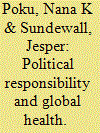

|
|
|
|
|
| Summary/Abstract |
Globalising dynamics have had wide-ranging and pervasive impacts on nearly every form of human relatedness, which now include the bases upon which states calculate and express their political responsibilities. As the ‘reach’ of practical and normative pressures extends and their demands intensify, the compass of state responsibility is becoming a key pressure point for facing the challenges and mediating the tensions of our globalised and still globalising world. This theme is examined from a global health perspective. The general disposition of states toward their acknowledged political responsibilities is unlikely to change, but the combination of legal, normative, political and practical dynamics impinging on them have already begun to register, as both states and the international system adjust to a politics that now have global dimensions.
|
|
|
|
|
|
|
|
|
|
|
|
|
|
|
|
| 10 |
ID:
158922


|
|
|
|
|
| Summary/Abstract |
India is frequently cast as a troublemaker and blamed for the breakdown of the Doha Round. This article provides a critical re-reading of India’s trade policy and its position in multilateral trade negotiations. It challenges the widespread characterisation of India as a recalcitrant spoiler, intent on derailing trade liberalisation at the WTO. It shows that with the emergence of its highly-competitive, export-oriented services sector, India became one of the leading advocates of global services trade liberalisation in the Doha Round. Yet, not unlike the traditional powers, India’s offensive trade interests are also combined with significant defensive concerns in agriculture.
|
|
|
|
|
|
|
|
|
|
|
|
|
|
|
|
| 11 |
ID:
158918


|
|
|
|
|
| Summary/Abstract |
This article critically analyses the representational practices of serious (video) games that focus on refugees. It argues that the technological form of serious games can simulate the historical, political and socio-economic factors that shape why refugees leave their home country and their experiences when travelling to host countries. They are able to mobilise intellectual agendas which challenge the de-contextualised representations of refugees typical in traditional media. As such, they challenge players to critically reflect on the complexities of refugee experiences and politics, thereby presenting a potential to move away from grand emotional discourses of pity and compassion.
|
|
|
|
|
|
|
|
|
|
|
|
|
|
|
|
| 12 |
ID:
158923
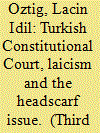

|
|
|
|
|
| Summary/Abstract |
From 1989 onwards, the Turkish Constitutional Court justified the headscarf ban in universities by citing laicism. Interestingly, in 2014, the Court found the headscarf ban in courts unconstitutional and revoked it by again citing laicism as the main reason. How can this seemingly paradoxical practice be explained? This article traces the trajectory of the headscarf issue in Turkey by analysing and contextualising the Constitutional Court decisions. In order to explain how and why the Constitutional Court issued two opposing views of the headscarf ban, this article focuses on the changing political climate and legal developments that took place in Turkey between 2008 and 2014.
|
|
|
|
|
|
|
|
|
|
|
|
|
|
|
|
|
|
|
|
|